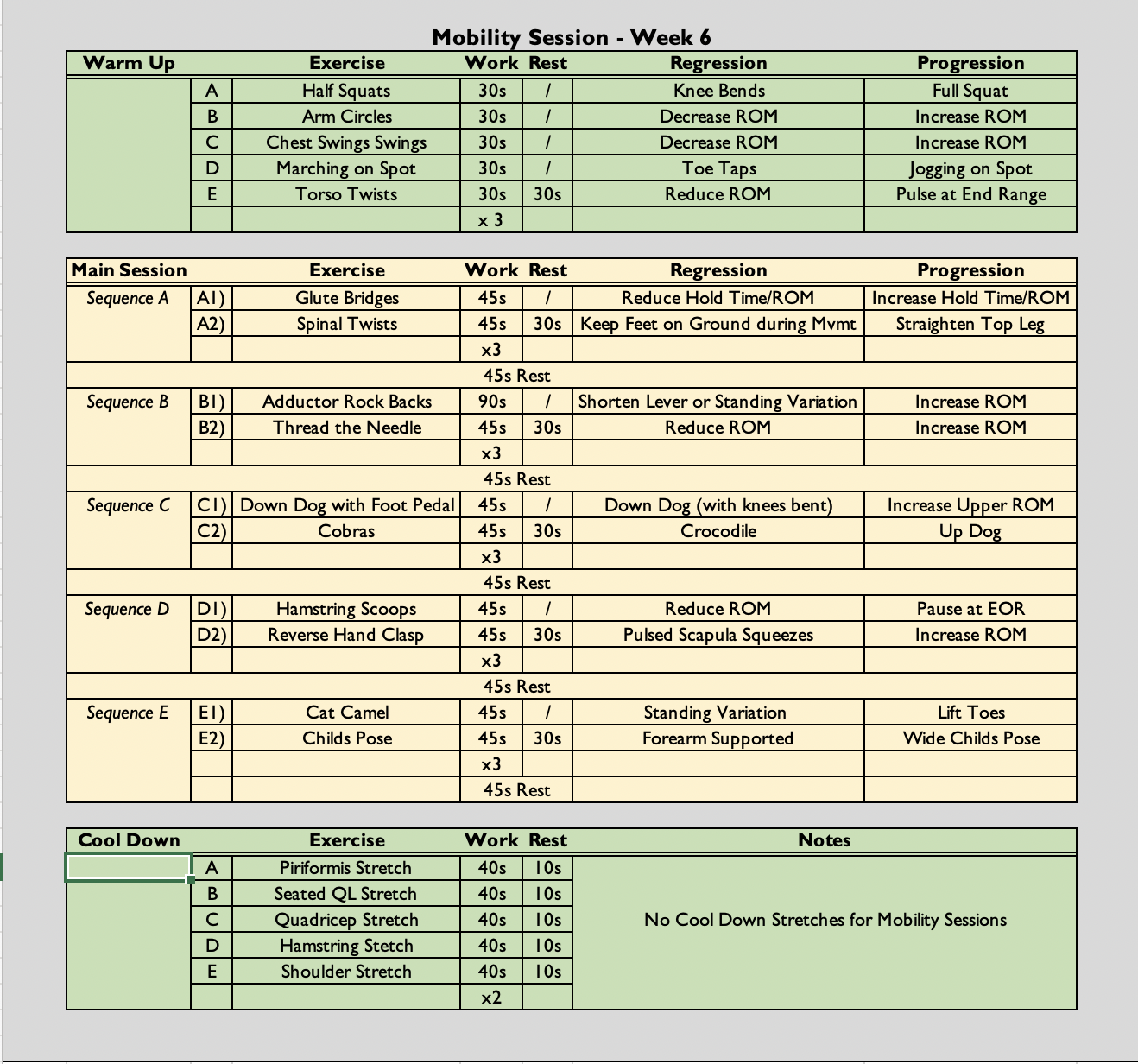27th December – 2nd January
- Hours: 15
Main Theme Addressed During Phone Calls
- Preparing for week 7
- What to expect in the gym
- How the group sessions will look moving forwards
- What facilities they can and cannot use during their recovery
Mobility Class
- ((45s secs x 2 followed by a 30 second rest) x 3) x 5
- The class is always symptom-led as opposed to graded exercise therapy. Participants are free to rest when needed. They can end the class early if they have reached their limit and they can reduce the amount of sets they do if necessary.

Analysis & Evaluation
- Phone calls during week 6 involve getting prepared for week 7. Week 7 brings a close to the ‘virtual’ component of the programme as the group session will take place in a studio and the ‘build your own’ session will take place in the gym.
- There is naturally some anxiety around transitioning to on-site as most have some apprehension about being around a number of people in an enclosed space. However, many of them note something along the lines of, ‘at some point things have to be normal’ or ‘i need to stop avoiding things.’ Therefore, despite some concerns the consensus was positive about the transition. Interesting, one study found a very weak link between anxiety and depression and previous COVID-19 infection (Klaser, et al., 2021) which I was quite surprised about. However, this study is not exclusive to those with ‘long covid’ symptoms. Therefore, this finding may not be applicable to this particular population.
- Furthermore, publications are crying out for a multidisciplinary approach to the multi-faceted ‘long covid’ syndrome. Mental health support is not often omitted from papers focusing on the management of ‘long covid.’ Indeed, one review paper highlighted that many people are effected emotionally after COVID-19 and previously hospitalised patients, particularly women, are at risk of developing anxiety, depression and/or PTSD (Aiyegbusi, et al., 2021).
- On top of this health related anxiety patients may exhibit, there is also the anxiety that some people have in regards to entering a gym environment. Many are worried that they will be judged by others or that they will look silly if they make a mistake or need to ask for help. I am fairly confident in settling these worries; however, I am always mindful to programme their drop-in gym session during ‘off-peak hours’ to prevent them becoming overwhelmed. However, it is January, a well known busy period, so I have also prepared them for the possibility of it still being a busy area.
Conclusion
- I have worked in a gym setting for a number of years now and as a result do not have any worries or anxieties about being in that environment. However, I remember a time when a gym environment would be intimidating to me and I have certainly helped a lot of people grow in confidence within a gym setting. Working with those who have had COVID-19 though brings additional challenges to easing concerns. Not only am I easing their concerns about entering an enclosed space with more people than what they are used to whilst the Omicron variant is circulating the UK but I am also trying to ease some pre-existing worries about the gym environment. This can be difficult but I believe it is a crucial part of their recovery. Physical activity aids immunity, reduces inflammation and has a positive impact on mental health which are all things which could potentially speed up their recovery. Therefore, I will spend a significant period of time discussing week 7 during week 6 to calm any concerns and create a safe and positive transition for the participants.
Revisiting Reflection
References
- Aiyegbusi, O. L., Hughes, S. E., Turner, G., Rivera, S. C., McMullan, C., Chandan, J. S., Haroon, S., Price, G., Davies, E. H., Nirantharakumar, K., Sapey, E., Calvert, M. J., & TLC Study Group (2021). Symptoms, complications and management of long COVID: a review. Journal of the Royal Society of Medicine, 114(9), 428–442. https://doi.org/10.1177/01410768211032850
- Klaser, K., Thompson, E. J., Nguyen, L. H., Sudre, C. H., Antonelli, M., Murray, B., Canas, L. S., Molteni, E., Graham, M. S., Kerfoot, E., Chen, L., Deng, J., May, A., Hu, C., Guest, A., Selvachandran, S., Drew, D. A., Modat, M., Chan, A. T., Wolf, J., … Steves, C. J. (2021). Anxiety and depression symptoms after COVID-19 infection: results from the COVID Symptom Study app. medRxiv : the preprint server for health sciences, 2021.07.07.21260137. https://doi.org/10.1101/2021.07.07.21260137